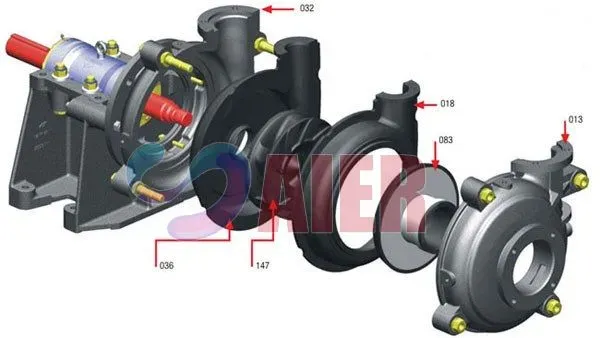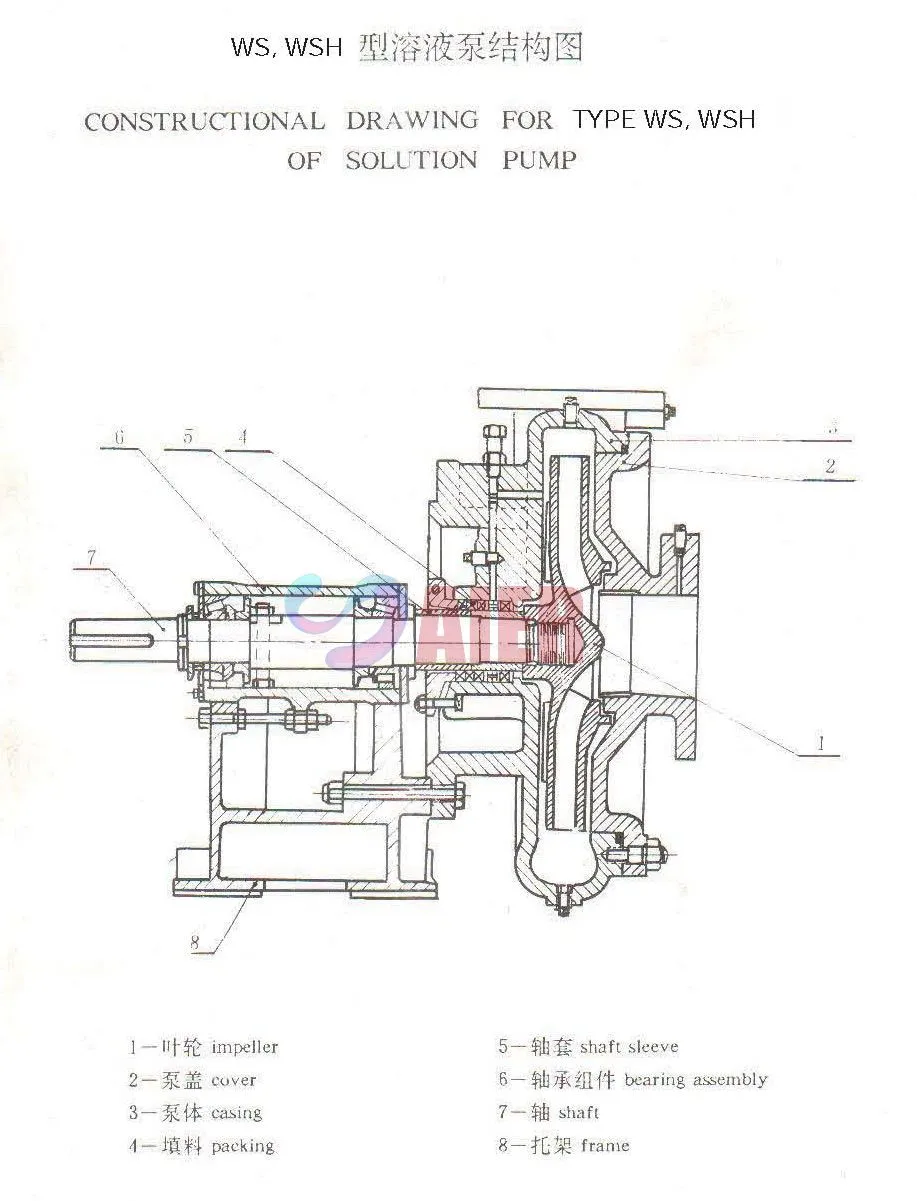May . 30, 2025 09:39 Back to list
Durable Screw Pump for Slurry - Efficient Mud Handling Solutions
- Understanding Screw Pump Fundamentals for Slurry Applications
- Technical Superiority: Performance Data That Sets Screw Pumps Apart
- Global Manufacturer Analysis: Capability Comparison
- Precision Engineering: Custom Solutions for Extreme Conditions
- Industry-Specific Applications Solving Real Operational Challenges
- Supplier Selection Strategy: Critical Evaluation Factors
- Future Trends: Innovations Transforming Slurry Pump Technology

(screw pump for slurry)
Understanding Screw Pump Fundamentals for Slurry Applications
Screw pumps handle high-viscosity, abrasive fluids like mining tailings, drilling muds, and industrial waste sludge through intermeshing rotors. Unlike centrifugal alternatives, these positive displacement pumps maintain flow consistency regardless of pressure fluctuations. Progressive cavities create a continuous flow path while minimizing fluid disturbance, allowing transportation of solids up to 60mm in diameter without clogging. The principle enables consistent 0.5-3.0 m/s fluid velocities ideal for protecting pipeline integrity when moving mixtures containing 40-70% solids concentration. Operational simplicity and reversible flow direction further solidify their position in demanding slurry transfer applications worldwide.
Technical Superiority: Performance Data That Sets Screw Pumps Apart
Screw pump efficiency benchmarks outperform centrifugal alternatives by 15-20% for viscosity levels above 500 cP, maintaining 65-75% volumetric efficiency at working pressures exceeding 48 bar. Recent field data from copper processing plants demonstrates continuous operation for 8,000 hours between maintenance interventions when handling slurries with 350μm particle size. Critical technical advantages include:
• Near-pulsationless flow (±1.5% variance) reducing pipe fatigue
• Self-priming capabilities at suction lifts to 8.5 meters
• Linear flow/pressure curves enabling precise process control
• 30-40% reduction in hydraulic hammer risks compared to piston pumps
Material science innovations like tungsten carbide rotor coatings extend service life by 3x in pH3-pH11 environments where traditional alloys fail. Energy audits reveal 18-22 kWh/ton savings over diaphragm pumps in mineral processing plants, justifying premium acquisition costs within 14-18 months.
Global Manufacturer Analysis: Capability Comparison
| Manufacturer | Max Flowrate (m³/h) | Pressure Rating (bar) | Material Options | Lead Time (weeks) | Global Service Hubs |
|---|---|---|---|---|---|
| Industry Leader A | 450 | 72 | Hastelloy, Ceramic-Lined | 10-12 | 38 |
| Specialist B | 280 | 64 | Duplex Steel, Rubber-Coated | 14-16 | 22 |
| Supplier C | 180 | 48 | Cast Iron, Hard Chrome | 8-10 | 17 |
| China Supplier D | 380 | 56 | 316L SS, Abrasion-Resistant | 6-8 | 29 |
Data reflects Q3 2023 industrial pump audits across 4 continents
Precision Engineering: Custom Solutions for Extreme Conditions
Leading slurry screw pump manufacturers implement computational fluid dynamics modeling to optimize rotor geometry for specific media characteristics. Recent projects showcase tailored configurations including:
● Hard-rock mining: Tandem rotor systems with 20:1 compression ratios managing 65% solid content slurries at 230 rpm
● Dredging operations: 45° inclined installations with reinforced shafts resisting 12,000N radial loads
● Food processing: Sanitary tri-clamp connections and EHEDG-certified surface finishes
● Petrochemical: Gas-handling variants preventing vapor lock at NPSH under 2.3m
Custom metallurgy selections address unique abrasion challenges - hyper-duplex steel rotors demonstrate 23% longer lifespan than standard 316SS in alumina transfer applications. Temperature-controlled stator options maintain seal integrity when processing 190°C geothermal fluids.
Industry-Specific Applications Solving Real Operational Challenges
Mineral Processing: A Chilean copper mine eliminated daily pipeline blockages by replacing centrifugal pumps with twin-screw units engineered for 32% solids density. Downtime decreased from 14 hours/week to under 2 hours, boosting annual throughput by 18,000 metric tons. Remote pressure monitoring prevented $780,000 in unplanned maintenance during the first year of operation.
Oil Sands Extraction: Canadian operators resolved bitumen froth handling challenges using screw pumps with hardened alloy components. The installation achieved 93% availability despite operating continuously at 55-60 bar discharge pressure. Wear rates decreased by 40% compared to previous piston pump systems, reducing component replacement costs by $320,000 annually.
Wastewater Treatment: Singapore's NEWater plant implemented corrosion-resistant screw pumps for moving digested sludge containing 8% fibrous solids. Energy consumption decreased 31% versus progressive cavity alternatives while eliminating the need for chopper devices that previously required weekly maintenance interventions.
Supplier Selection Strategy: Critical Evaluation Factors
Due diligence for slurry pump procurement extends beyond technical specifications. Plant managers should prioritize:
▸ Materials certification traceability ensuring compliance with ASTM A995
▸ Manufacturing facility ISO 9001:2015 accreditation with class 7 clean rooms
▸ Availability of regional technical support within 48-hour response SLA
▸ Spare parts inventory analysis confirming critical component availability
▸ Performance testing protocols exceeding API 676 Section 8.4 standards
▸ Reference validation from operations with equivalent slurry characteristics
Leading Chinese suppliers have narrowed quality gaps significantly – tier-one factories now incorporate SBB hydraulic testing rigs and coordinate measuring machines with ±0.003mm accuracy during rotor profiling. Payment terms ranging from 30% T/T upfront to LC 60 days provide supply chain flexibility.
Future Trends: Innovations Transforming Screw Pump for Slurry Technology
The next generation of slurry screw pumps integrates Industry 4.0 capabilities through embedded IoT sensors monitoring torque fluctuations predictive of mechanical failure. Recent installations feature vapor recovery systems reducing volatile organic compound emissions during hydrocarbon transfer by 72%. Material science advancements include nano-crystalline surface treatments demonstrating 50% lower friction coefficients in high-solids applications. Hybrid pump designs incorporating adaptive clearance controls automatically compensate for wear, maintaining volumetric efficiency above 92% throughout maintenance cycles. These developments position screw pump technology as the long-term solution for increasingly challenging slurry management requirements across global industries.

(screw pump for slurry)
FAQS on screw pump for slurry
Q: What factors should be considered when selecting a slurry pump mud screw pump supplier?
A: Prioritize suppliers with certifications, industry experience, and positive client reviews. Ensure they offer customized solutions and reliable after-sales support for slurry-specific applications.
Q: How do China screw pump for slurry suppliers ensure product quality?
A: Reputable suppliers in China adhere to ISO standards, use wear-resistant materials, and conduct rigorous testing. Many also provide certifications and compliance with international slurry-handling requirements.
Q: What distinguishes a screw pump from other slurry pump types?
A: Screw pumps excel in handling high-viscosity slurries with minimal pulsation, unlike centrifugal pumps. Their progressive cavity design ensures steady flow and reduced clogging risks in mud applications.
Q: What maintenance is required for a screw pump used in slurry transfer?
A: Regularly inspect wear-prone parts like rotors and stators. Lubricate bearings and seals frequently, and flush the system after abrasive slurry operations to prevent material buildup.
Q: Can screw pumps handle abrasive mud and slurry mixtures effectively?
A: Yes, quality screw pumps feature hardened metal components or rubber stators to resist abrasion. Proper material selection based on slurry particle size ensures extended service life.
-
Top Submersible Pump Companies High Quality Manufacturers & Suppliers in China
NewsJul.08,2025
-
High Quality Seal for 5 Inch Dredge Pump Reliable China Manufacturer & Supplier
NewsJul.08,2025
-
High-Efficiency Slurry Sand Pump from Leading China Manufacturer – Durable & Reliable Solutions
NewsJul.07,2025
-
High-Quality Slurry Pump Made in China Durable Steel Mill Slurry Pump & Parts
NewsJul.07,2025
-
High Quality Excavator Dredge Pump Manufacturer & Suppliers from China – Reliable, Durable, Efficient Solutions
NewsJul.07,2025
-
Wholesale Slurry Pump Closed Impeller Supplier High Efficiency China Slurry Pump Closed Impeller
NewsJul.06,2025
